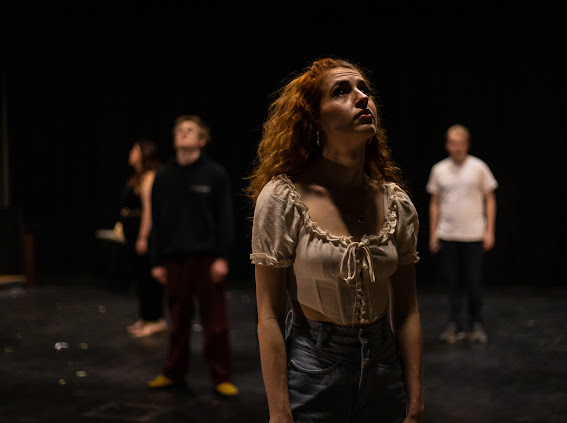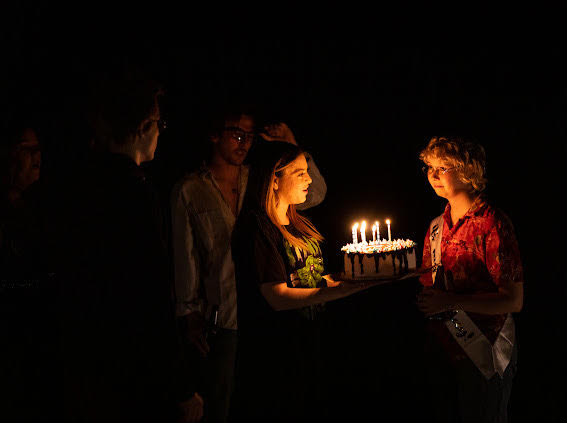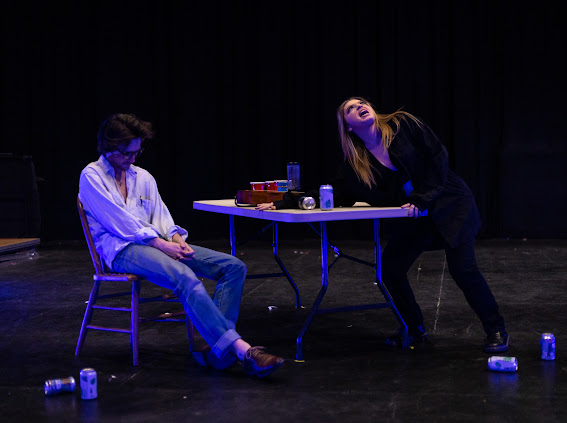This spring, the University of Nevada, Reno’s season of live theater came to a close with many f—s to give.
The potty-mouthed play in question is Aaron Posner’s “Stupid F***ing Bird.” A loose retelling of Anton Chekhov’s “The Seagull,” the play follows Emma, an aging actress, her son Con, a struggling aspiring playwright, and a string of supporting characters who either love them unrequitedly or don’t love them back.
If this sounds complicated, it’s all in keeping with the original. Emma loves Trigorin, a famous author. Con loves the aspiring actress Nina, who doesn’t love him back. Trigorin also loves Nina — who reels with guilt as she finds she returns his feelings. Mash, a young, ukulele-playing pessimist, loves Con — who, heartsick over Nina, barely knows she exists. Finally, Con’s pithy friend Dev loves Mash — who might be able to settle for him — maybe.
In short: everyone’s feelings are misplaced. Everyone’s set up for misery. The universe doesn’t care.

(From left) Jackie Haughn as Emma, Elliot Dungan as Dev, Alyssa Granger as Nina and Anson Wapstra Scott as Con.
Besides, there’s a mounting modern crisis to worry about. Posner’s adaptation lifts “The Seagull” from its original setting at a nineteenth-century Russian country estate to the present day. On top of being lost in love, the play’s young characters stare down the barrel of a bleak economic and ecological future. As many of us have already loudly proclaimed: f— this s—.
If hearing those words on stage will validate your feelings, “Stupid F***ing Bird” is the play for you.
And it is said. Often. But, thanks to great performances from UNR’s student actors, “f—” never loses its f—ing power.
The play’s small cast of seven is well-fitted to the task. They’re loud about their characters’ mundane problems, but it never feels overblown. They make convincing strikes at their characters’ deep flaws, but manage to entirely avoid the impression that they’re looking down on them. Under the compassionate direction of UNR acting instructor Rosie Brownlow-Calkin, that last skill really gets a chance to shine.
Anson Wapstra Scott helms as the play’s fumbling aspiring playwright, Con. He’d be a standout if his peers weren’t so f—ing good. He takes a deeply volatile, needy leading man at his word and gets his insecurity across with full force. Con’s drastic emotional changes can sometimes set in over the space of a few lines — a perilous transition that only a fully-committed actor can handle.
Similar demands fall effortlessly under the feet of Alyssa Granger, who plays Nina. Much like her delightfully dialed-up performance in last semester’s one acts, Granger anchors a larger-than-life aspiring actress in unabashed need. Big gestures and a big voice generally evade modern, realist acting, but they can play beautifully off of other, more grounded players. Granger knows this well, and she’s a joy to watch because of it.
Meanwhile, Maya Wolery, who played Big Pharma in the one acts last semester, returns to medicine as the middle-aged doctor Sorn. Sorn is Con’s kindhearted uncle and Emma’s older brother. He’s the only character free of the play’s romantic angst — though not entirely of his own volition. His are the regrets of a cautious, prosperous life already lived. How did I get here? How can I go back?

Maya Wolery as Sorn (right), opposite Alyssa Von Eberstein as Mash, Dungan’s Dev and Daniel Sincere as Trig.
Wolery is an unconventional choice for Sorn, but that only works in their favor. They imbue him with age without ever resorting to “old man” tropes. Though usually a quiet presence on stage, they make him shine when his solemn moments finally come.
This season, what would already be in-your-face talent is even closer than usual. Without technical support, “Stupid F***ing Bird” takes to the Redfield Studio Theatre with intimate seating and only minimal lighting at its disposal. Like Cabaret, it’s a script well-chosen for the venue, though for slightly different reasons.
Playwright Aaron Posner breaks the fourth wall all the f—ing time. This has mixed results.
Some are a committed and effective use of the audience. At one point, Con, befuddled by his romantic misadventures, literally asks the audience what to do. With viewers well trained to sit back and shut the f— up during a performance, he has to press hard to get replies. When he does, it’s a genuine dialogue, embracing the theater’s spontaneity with refreshing results.
Some of Posner’s swipes, however, feel like just a cheap wink in the audience’s general direction. It’s powerful when the characters break from the dialogue’s form to recognize the silliness and futility of their situation, but it’s very easy for the “guess what, we’re in a play!” vibes to stop at the first laugh they get.

Daniel Sincere as Trig (left) opposite Alyssa Von Eberstein as Mash.
Every now and then, Posner’s self-awareness ventures into sobering cynicism about the state of theater, which Con is already bemoaning at the start of the play. Some of it hits hard, but some of it assumes, shakily, that everyone watching is part of a captive audience, desperate to check their phones and move on with their lives.
In these moments, Posner is a bit like a professor who starts every lecture with the premise that their students want nothing more than for it to end.
It’s an assumption I can hardly fault theaters for making, especially this one. An outside observer might even think that the University of Nevada, Reno actively wants its theater program dead, what with the state of its funding and facilities and no word of its need for additional faculty ever being met.
That doesn’t mean the modern script’s new responsibility is to assume you think it sucks, though. Far from it — perhaps the opposite is necessary instead.
Peregrine Hart can be reached via email at peregrineh@sagebrush.unr.edu or on Twitter @pintofperegrine.
